#ableism in media
Text
not only should any autistic character who’s ever been infantilized by their fanbase kill and maim more people, but they should also fuck as nasty as possible too. as a treat
#revising a dead post that you guys liked (about autistic characters killing people)#cal.txt#autism#autistic representation#autistic characters#autism posting#fandoms#blorbo tag#jack kline#supernatural#entrapta#spop#I don’t go to SheRa and never will but I feel so deeply for how Entrapta was treated#a whole 30 some year old woman and y’all are doing That? absolutely foul#autistic coding#autistic coded character#fandom ableism#ableism in media#you cannot claim to be an ally of autistic people or disabled ppl in general while viewing us as undesirable or childlike end sentence.#either you see us as complete autonomous adult human beings or you don’t#and if your blorbo is autistic and you want them carnally do NOT be afraid to speak about it#do not let ableism win. post about how badly you wanna do things to them. it’s a free country and you’re literally correct#fandom tag#jack spn#jack supernatural#jack kline winchester#jack winchester#spn fandom#supernatural fandom#castiel
2K notes
·
View notes
Text

Image description:
Text reads:
"Ableism looks like calling people ‘inspiring’ for navigating asystem that is designed for exclusion, while doing nothing to hold the system accountable."
- Carson Tueller
#Ableism#disability rights#disabilities#abelism#disability#ableism tw#ableism cw#ableism in media#ableism discussion#ableism mention#disability justice#chronically ill
248 notes
·
View notes
Text
Me, holding a gun at the latest author to risk my ire: Say it! Say "autistic"! Not "an old soul" or "just a little bit different" or "not like other people" or any of those stupid quirky euphemisms you make when you want to make an autistic character without actually fucking committing to it! AUTISTIC! The word you're looking for is AUTISTIC!
#actuallyautistic#i get it when it's a fantasy series or historical setting where the word and diagnosis don't exist yet#but the sheer amount of cowardice that contemporary media shows when it comes to autistic and neurodivergent characters is appalling#stop dancing around the word like you're scared it'll summon autism to your door if you say it#it won't bite#autism in media#ableism in media
170 notes
·
View notes
Text
I love Batman but I always be uncomfortable and annoyed with how comic writers constantly demonize Batman’s rouges and constantly treat them as dangerous criminals who deserve to be mistreated in Arkham Asylum instead of seeing them as people with mental illnesses and physical and mental disabilities who need therapy and deserve a second chance at redemption
22 notes
·
View notes
Text
Hi! Sorry, the way OFMD handled quite a few things is, in fact, ableist.
And it's important that people are pointing it out so that we can hold the media/creators that we love accountable for things like this, and they can do better in the future.
So, out the gate I'm going to say this: Yes, this is in relation to the Current Discourse™. No, it has nothing actually to do with the very common headcanon that Izzy's got some actual chronic illness or a gastrointestinal disability in canon, so much as the idea that mocking very common symptoms of those issues - even if, in the context of said mocking, it isn't caused by or related to those kinds of issues - is ableist.
For a non-OFMD example: Consider two people doing poorly in their classes, one has a developmental disability and the other maybe just isn't interested in the subject. It's still just as ableist to call the latter 'retarded' as it is to call the former that.
And so the show not challenging those ideas (in a similar way, I might add, to Stede's deriding/mocking Izzy's prosthetic when he was mad at him going unaddressed) does mean it's ableist/enabling ableism. Even if that isn't the intent, it's the impact that matters, and people with disabilities (or who's disabilities share some of the experiences mentioned/depicted) like those that are portrayed in the show the way they are are saying those portrayals hurt them and are ableist.
#the dork is being a dork#ofmd#our flag means death#ofmd season 2#our flag means death season 2#izzy hands#stede bonnet#r slur#(i am not using it as a pejorative and i believe the impact of my statement would be hindered by my censoring it but i will tag it)#ableism#ableism in media#and the importance of calling attention to it
21 notes
·
View notes
Text
I'll never forgive Don Mancini for a lot of things he's done on Chucky, but I think the most angering one is probably making the one (most obviously) autistic-coded child turn evil.
#caroline cross#chucky#chucky tv series#autism representation#autistic coded character#ableism in media#ableism in the horror genre#text post#tw: ableism
55 notes
·
View notes
Text
So something I’ve been thinking about with Hi-Fi Rush is that clearly there’s disabled characters and none of it is ever made into a Big Deal.
Yeah, Chai got a prosthetic arm. It’s wicked cool
Yeah, Peppermint lost a leg. There’s some potential lore there
Yeah, almost everyone else has Vandelay parts but we never even learn why or if they’re just meant as enhancements. For example, does Zanzo have the neural implants just to get his ideas out of his head faster or because he needs that accommodation? It’s never addressed because it doesn’t really matter
The game never makes disability or accommodation feel weird, out of place, or negative. It just…is
HOWEVER, Chai is blamed for being “defective.” Throughout the game he is reduced to being known as “the defect” that needs to be wiped out (or experimented on/with in Zanzo’s case).
None of this is Chai’s fault. It’s Kale who threw the music player into the Armstrong machine and yet Chai is blamed for it. At one point Rekka even says that HE ruined her perfect no defect record as if his existence was the mistake and it’s his fault.
Anyway, as a disabled person, I think this was a wonderful way to bring in ableism and what being disabled can look like in the world into the story while keeping the upbeat, fun vibe of the game.
I think every disabled person has felt blamed for simply existing (either people think you aren’t doing enough to “fix” yourself or you must have done something wrong to cause your disability or you’re even just making it up/being lazy/etc). It was so nice to see that reflected in the game while still seeing all of these disabled characters kick absolute ass in fights and also just exist in the world.
#hi fi rush#hi fi rush chai#hfr#hfr chai#hi-fi rush game#hi fi rush rekka#hi fi rush kale#disability#disability in media#disability in games#ableism in media#ableism in games#hfr zanzo#hi fi rush zanzo
129 notes
·
View notes
Text
"but I don't want to have the injuries my characters sustain have lasting consequences--"
then simply do not write stories where your characters receive traumatic life-changing injuries. It's literally not difficult. If you don't want your character to spend the rest of their life minus one arm, then simply do not write them getting their arm chopped off. No one is forcing you at gunpoint to chop your character's arm off.
Why are you people so desperate to remove all stakes and meaning from your stories. Why are you so desperate to beat your audience over the head with the fact that they shouldn't care about a single thing that happens in your story.
Why are you writing about characters being horrifically and life-changing injured if you want to just hand-wave those injuries away like they never happened.
If you do this, you are, in fact, just a shit writer and you should in fact be embarrassed and ashamed. I do not give a single shit what excuses you try to make to defend this shit.
You're ableist, you're bad at writing, and you should feel bad.
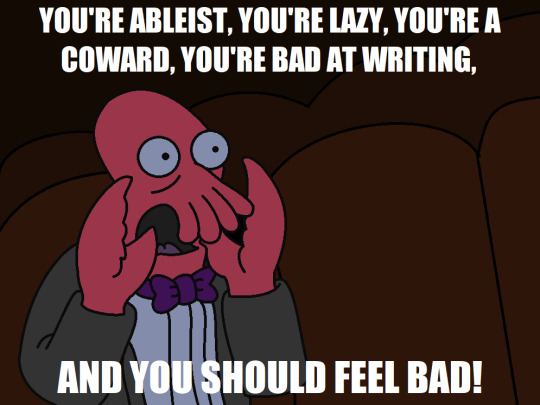
[ID: A digital recreation of screenshot from the show Futurama, showing an alien character in a tuxedo cupping their hands near their mouth, now edited to be shouting:
“You're ableist, you're lazy, you're a coward, you're bad at writing, and you should feel bad!”.
End ID.]
#writing disability#writing tips#writing advice#ableism#systemic ableism#ableism in fiction#ableism in media#can ableist people stop being ableist on my post for 5 seconds#crying about how they don't want consequences in their stories....#okay then WHY ARE YOU CHOPPING YOUR CHARACTERS ARMS OFF#YOU'RE ALL ABLEIST COWARDS WHO SUCK AT WRITING
134 notes
·
View notes
Text
I hate when media tries to use allergies, and concern about those allergies, to be a short hand for someone being "annoying"
Not only do they make having allergies a personality trait, they make it a negative personality trait! As if having allergies is a choice, or somehow more of a burden for the people around the person with the allergies
And they try and make me dislike this person because they are always asking about food, or detergent, and they aren't spontaneous or risk taking
But it always back fires because for someone to be so worried about an allergy, its usually pretty severe AND they're probably used to people rolling their eyes and ignoring it. Which is usually what the main characters are doing!
So now I care about this supposedly annoying character and am 100% on their side
#rodney mckay#food allergies#disabilty#chronic illness#ableism#ableism in media#death in paradise#neville parker
312 notes
·
View notes
Note
Okay I 'm that one anon who prefaced that I wasn't attacking and I mention that because I didn't know how to re-identify myself
Anyway I agree without you on how poorly they handled Ironwood's downfall but what else you said continues to baffle me as a writer and as one whose trying to grow and trying to incorporate more characters how would you suggest going about topics of emotionally "throwing away ones humanity" if said character has prosthetics?
Like...and understand I'm trying to figure out how to word this. If you were to take...let's keep rolling with James. As he was before the absolutely asinine commentary on what him sacrificing his arm meant. If his prosthetics are just that and not meant to symbolize anything. Can you talk about him or any character or original creation under the idea of what they could be doing to themselves emotionally or mentally?
I'm really trying to find where to go cause it just seems that with disabled characters writing certain things for them is heavily limited as to what can be done because certain attempts at things could be labeled as ableism when that wasn't the intention either in an a stumble at the execution of an idea or because the audience (and I'm not saying this is Rooster Teeth cause holy shit is it not them) took something about what was being done and applied it to an aspect of the character that the creator wasn't even looking at.
On that note what they did in general with Penny and whatnot was odd but what would you do about a character that if they had the choice didn't want a disability? This is a more of an out of somewhere questions cause typing this I always think of the Spirit Fairer discourse where there was apparently a character who had a wheelchair and I guess at someone point didn't have it anymore and was happy about that. But people got so mad that the developers rewrote the story so the character remaind wheelchaired bound, but that just makes me ask is it wrong for a character to want to be able to not have a wheelchair? Like is it wrong to write a story where a character wants to be able to walk? Like how would you go about having a character having a disability and not wanting their disability anymore?
Honestly anon as I said before I just….wouldn’t. To put it another way, what does having someone throw away their humanity add to the story? Why do you feel like you need it? And why does it need to be the disabled person? All people have humanity because they’re human. Trying to have someone throw away their humanity is…dangerous territory because more often then not those stories tend to rely heavily on either disabilities or mental illness to “justify” that and for obvious reasons that is extremely ableist. And even without using either of those things it still can be interpreted by audiences to be the disability or mental illness’s fault and what made them lose their humanity. It’s…far too tricky a subject for me to think ever is worth it to be in a story.
If you’re asking how to make a disabled character evil that’s entirely different because evil people can still have their humanity because they’re human. They just happen to be an evil person who does bad things. Making Ironwood evil isn’t inherently a bad thing, but CR/WBY saying that losing his arm is a symbol of his lost humanity is. Then repeatedly having the villains be disabled is a problem. It’s important to ask “why does the disabled character have to be evil” when making them a villain because so often disabilities are used a short hand for villainous traits which is ableist and harmful and tells disabled audiences that their disabilities are seen as villainous.
It is generally the job of the author to really think about these things and the tropes that they are relying on for their story. As a society so many people view more metal = less human which just isn’t true and is actively harmful towards disabled people. Do you remember at all the Mars Rover Opportunity? How emotional people got when her last words came out “My battery is low and it's getting dark”. My friend from my discord group put it perfectly: Oppy is all metal but she’s human. She wasn’t born, she was created but she was alive. We loved her to humanity. People mourned when she passed. NASA played a love song for her. Her being metal didn’t matter, just as James being half metal shouldn’t matter, just as anyone having prosthetics shouldn’t matter. They are still humans with humanity, and I just don’t see any reason to write a story about someone willingly throwing away their humanity.
So Ironwood "wanting" to throw away his humanity and becoming more monstrous is ableist. Doing this to any disabled character is ableist because their disability will inherently be used as a shorthand for said monstrousness either by the author or audience.
Here are a few good videos that discuss the topic further and really discuss the issues with disabled villains:
youtube
youtube
Some great points the video discusses:
A lot of villains motivation is being "cured" of their disability which stems from this idea that disabled people are miserable and hate being disabled and can only be whole and happy if they are cured. Yes some people would like to have a curse for their disabilities, not everyone wants that and having most villains want that is a problem as it stems from the idea that being disabled is inherently tied to misery and suffering which just isn't true.
It also makes the point about how oftentimes disabilities are used as a visual shorthand for inhumanity in their villains and them merely being disabled and looking "other" is a clue to the audience that said person is evil and even inhuman in far too many cases. We repeatedly see this in RW/BY with Tyrians tail, Cinders Grimm arm, Salem, and James's new prosthetic. All are framed as evil and monstrous to show us how evil they are.
At the end of the day, I think it is crucial to talk to someone who has the disability you want to represent in your work about how you are portraying them. I cannot and do not speak for all disabled people in this discussion and can only really discuss my feelings/the feelings of those I have talked with. When writing disabled characters it is critical to include people with those disabilities in the discussion of how the characters story should go.
#rwde#james ironwood#ironwood protection squad#pro james ironwood#pro ironwood#general ironwood#general dadmiral#dadmiral ironwood#Ableism in RWBY#Ableism in Media
31 notes
·
View notes
Note
Do y’all know where the writers talked about how Ironwood losing his other arm and getting another prosthetic is symbolic of him “losing his humanity”? I was going to mention it in a post, but I wanted to check what they said so I’m not spreading misinformation (even though I doubt it’s gonna sound much better in context)
it's in the dvd commentary for v7, timestamp around 3.48 found here. the context for it only makes it sound worse imo, especially from the ablebodied writers of the show deciding this is the allegory they wanted to make about one of the shows long term disabled characters after saying yang's disability arc was "too boring" to write.
25 notes
·
View notes
Text
that reminds me, it's nice that I've been able to see other folks talking about how ableist Fullmetal Alchemist is after seeing so many people say it does disability well when disability as divine punishment happens throughout the work and the main premise being disabled characters working to magically fix their disabilities (that they received as divine punishment)
9 notes
·
View notes
Text
Hunter and the “curing the disability” trope: an analysis of the twist of For the Future

Let’s start with the basics. How do you define a “disability”?
In basic terms, a disability is a physical or a mental condition that limits a person’s movements, senses or activities; a disadvantage, or a handicap.
In the universe of the Boiling Isles, there are a few things that can be considered a disability which do not apply to our world. For example, Eda’s curse is a pretty clear metaphor for disability, and would absolutely count as one. It limits her, it limits her magic. It’s a disadvantage, a handicap. Curses are disabilities; ones that can be caused by other people or inflicted onto someone with malicious intent, much like disabilities that can come from injury.
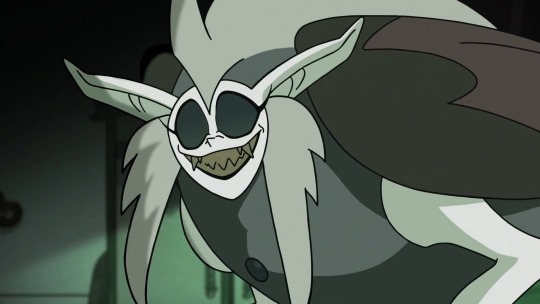

Furthermore, magicless witches and witchlike creatures are also disabled. The entire Boiling Isles runs and is dependent on magic and the assumption that everyone can use it. The inability to do magic is, again, a limitation. A disadvantage.
We even see parallels in disabled experiences in those with weak magic. Willow was bullied relentlessly for years because people thought she her magic was weak. This reflects the experiences of many disabled children’s school years; disabled children are more likely to be bullied because of their disability.

Willow is often called “half-a-witch Willow”, which, as we learn in Any Sport In A Storm, is an established term not just made up for Willow. “Half a witch” is an established, well-known derogatory term for witches with lacking magical abilities. The very existence of derogatory terms for this obviously draws parallels to minorities of the real world; with, of course, the most apt metaphor being disability.
Hunter uses the term to insult himself for his own lack of magical abilities. A sort of internalized ableism; one that could have (dare I say it? should have) been resolved within his storyline.
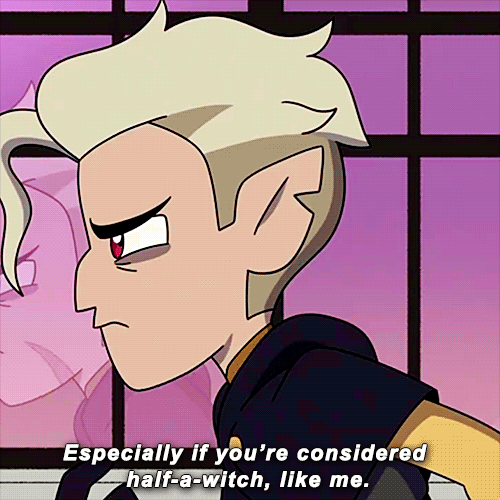
This would be a disability that one is born with, as opposed to gaining, like Eda’s disability is. Willow is naturally bad with abominations, and Hunter was created without a bile sack; thus, without a natural ability to use magic.
So, now we have established that powerless witchlike creatures are disabled in their universe.
Hunter as a disabled character is quite an interesting point of analysis, especially in terms of his relationship to Flapjack. Flapjack is his disability aid. Not just in the “emotional support” sense for his PTSD, but using Flapjack’s magic (rather than just being unable to use any magic due to his natural lack of it) is a form of disability assistance. Flapjack made it easier for Hunter to exist and function in this world not made for creatures like him; powerless ones.

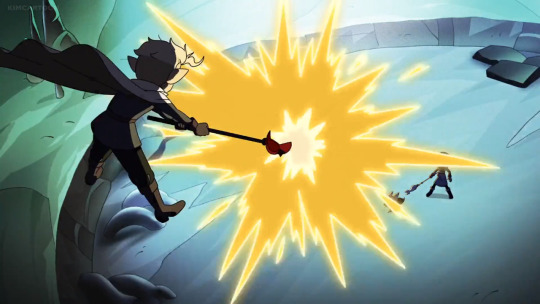
So, when they killed off Flapjack, this is, metaphorically speaking, them killing off not only the disabled character’s best friend, but also taking away the disabled character’s disability aid as a form of or catalyst for “character development”. Which, itself, is an ableist trope which might deserve its own analysis on how it appears in The Owl House.
And then, here comes the writers, saying that Flapjack’s death gave Hunter the ability to naturally use magic.
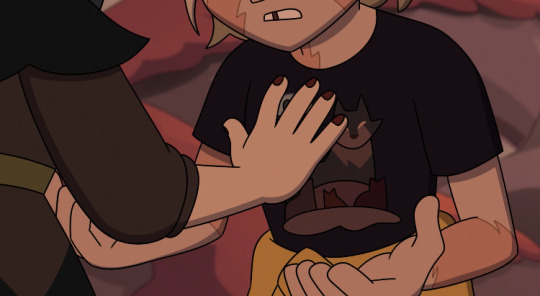
To put this into perspective, in terms of the allegory here, this is the Boiling Isles equivalent of a writer killing off my service dog and then saying that the death of my service dog cured me of my autism.
If you are unfamiliar… The “curing the disability” trope is incredibly, infuriatingly ableist. It:
1 ) Implies that disability is something that can be overcome or cured in the first place.
2 ) Oftentimes, it’s treated as a “reward” for a character undergoing development. Hunter, of course, only was able to be “cured” because of how close he became with Flapjack. The disability being healed, narratively speaking, is his “reward” for overcoming his hatred for wild magic and Palismen, and making a true friend.
3 ) It implies that disabled people cannot be truly happy the way they are. If the happy ending that the writers imagined for Hunter was him magically losing his disability… That’s pretty damn depressing for us with disabilities in the real world.
And this isn’t even going into that many real-life disabled people don’t want to be cured.
So, basically: this plot development is bad. When Flapjack first died, I worried that this might be where they take it, but I ended up putting my fears aside. They did a very good job with portraying Eda’s disability; surely, they would have done enough research to know to avoid this well-known ableist trope with their other disability allegories!
Well, apparently not.
Disabled people deserve better than a show which is stated in its marketing of this season to have themes of disability having a disabled character’s disability aid and service animal die, and then be “cured” because of it. We deserve better than where Hunter’s arc is going. We deserve better than this.
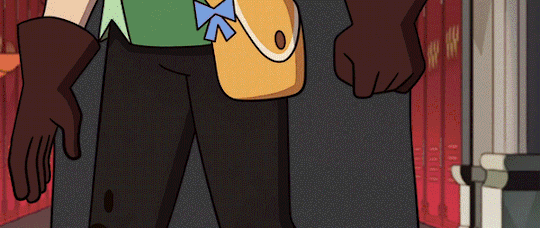
#the owl house#toh#for the future#hunter noceda#hunter wittebane#hunter toh#flapjack toh#flapjack#disability advocacy#ableism in media#actually disabled#actuallydisabled#azure does a thing
146 notes
·
View notes
Text
Disability representation
Disabled character rarely get to be their own, full character, instead they tend to fall in one of a few archetypes of disability representation, few of which grant them much humanity and in many cases, disabled characters were/are clearly separated from able-bodied society.
with early characters, the only place disability was seen at all is villains and other vile characters, who´s disabilities served to underscore that they were evil and distinctly different from what was usually an able-bodied group of heroes. Disability itself was represented as a moral defect, which deserved ridicule and separation from "proper" society (which is to say able-bodied society).
In the past as well as many places currently, disability is shown as something damning you to live miserably and bitter and without any hope for a happy or fulfilling lives, sometimes death is portrayed as a best case scenario for a disabled character like this and any responsibility of society to improve conditions for disabled people is disregarded.
Other cases present Disabled characters as a motivational story, meant for a able-bodied audience, in which characters often overcome their disability in one way or another, which is dishearteningly impossible for many real people with disabilities and only serves to play into the idea that disabled people, instead of getting external support from government or fellow people to make a world they´re able to participate in, should "pull themselves up by their bootstraps" and simply try harder.
A more modern issue in disability representation is when there are simple fixes to a disability, which either reverse it fully, or make the disability non-disabling to the characters, this is especially prevalent in sci-fi and superhero media, but can appear anywhere. In these instances a character might technically have an impairment, such as a missing limb, but it is not addressed and instead "fixed" by, for an example, a hyper-advanced prosthetic which they constantly wear and functions perfectly as a real arm. This might be a nice thought in some instances, but it is extremely unrealistic and causes a disconnect between a fictional disabled character and the reality of being disabled.
In short, there is still a lot of work to be done in regards of representing disabled people as actual people and not disregarding their disabilities entirely.
(EDIT: to be clear, i don't mean to say that any of these ways of representation are always awful and shouldn't exist, i only want to point out how common these stereotypes are and how they can potentially be harmful. i think some of these do a have their place, but i think there should also be more nuanced and varied representation of disability.)
(here are some sources i used to research this:
https://cma4962.wordpress.com/2016/03/01/history-of-disability-on-film/
https://www.bbc.com/news/blogs-ouch-27883836
https://www.handinhandqc.org/blog/problematic-representation-of-people-with-disabilities-in-the-media
as well as my own experiences with media)
#disability#disabilties#disabled#physical disability#disability awareness#disability pride#disability representation#disability stereotypes#ableism#ableism in media#ableism mention
15 notes
·
View notes
Text
I feel like surviving psychosis makes you scared of no horror movie/show any living neurotypical can make. I mean I wasn't often scared by any to begin with but eh. It's psychosis that's the scariest thing in this life (well also the utter boringness of the reality society has built) so I'm honestly baffled that nobody has made horror content from our perspective/through our eyes 🤷♀️ but eh, maybe they are too busy being scared of us to write new and actually-informed material. Yes ableist writers I'm coming at u but not with a knife, just with the sick burns
#schizospec#ableism in media#scary illnesses#schizospec things#actually schizospec#writers do better#no more villainizing#end stigma#stigma is real#schizospec humour
11 notes
·
View notes
Text
It would be nice if Star Wars actually treated their "good" disabled characters as actual disabled characters.
We see a lot of "bad" disabled characters have viewable disabling disabilities (ex: the latest The Bad Batch episode featured a cane-user with a prosthetic arm. This man was a hoarder of resources, and quite greedy and self-serving. Disability=hoarding resources is a TERRIBLE thing for Star Wars to highlight, but there they just went. That's a whole post I can make on its own, but I digress.)
But there are so few times that Star Wars truly acknowledges its disabled characters' disability in a positive light. It is always swept under the rug and forgotten about. This is what we have for our disabled "good" characters:
Anakin's hand only ever has problems twice--both of which aren't even true issues. His hand just gets caught by magnets. That's it. Sure, one time a little spark went through it durring the Zillo Beast arc, but despite all other mechanical appliances dying and short-circuting, Anakin's mechanical prosthetic does NOT. They didn't want to show Anakin without the use of his hand. Oh and he's turned into the "bad" character when his disability becomes actually acknowledged. Facisit disabled person... how charming (sarcasm).
Luke's prosthetic hand also does not cause him any true issues--again, minor inconveniences.
Echo's prosthetics are not acknowledged, ever. They act as if Echo has two hands, and he's constantly seen holding stuff as if he has two hands. Sorry, but he can't balance a giant ass box on a scomp like that. He would have to compensate--move his arm so that it balances differently.
Tech does not need to be more than autistic-coded. It's not a requirement to label everything. However, he has only had issues with his autism once. That's a good first step! But it's just a first step. Not to mention, he's a whitewashed savant. This is the most blatant, frustrating autism stereotype. I've already made a post about this.
Kanan and Chirrut's blindness is perhaps the most visibly disabling disability in any of the shows; however, said blindness is magically compensated for by the Force. They both still struggles with many things, which is a good change of pace, but ultimatley, it's not the representation it's meant to be. And, for Kanan, it is CURED at the end, before he DIES. Chirrut ALSO dies. I think that speaks for itself.
Yes, they are still disabled. That is not in question. But it's repackaged in a 'non-disabling' sense. Because why show disability when everything can be magically fixed? Why show disabled characters having realistic issues with their disability when it could be disabled characters made palatable for an abled audience?
Yes, a good number of disabled people would like to be, for lack of a truly appropriate term, ""fixed"" (a whole different topic, though--and a huge one at that). I don't doubt many amputees would probably like the a prosthetic like Anakin's. And yes, it would be nice to be so easily and readily accepted as disabled people like they are in Star Wars.
However.
The continued treatment of disabled people as if they aren't disabled is a massive problem in today's, real-life world. Because we don't have that luxury of being treated as nicely. So as great as it is to dream of a life where we're accepted as normal, IT IS IMPORTANT TO VIEW THEIR DISABILITY AS NORMAL IN THE FIRST PLACE.
It is necessary to see openly disabled people being clearly disabled, while still being viewed as equal, "normal" people. When disability is only shown openly as disabling when it is for the greedy or the facists... that is ableist writing.
All I want is for a main character to be openly disabled, in a disabling way, rather than just magically fixed and unacknowledged. Disability representation can only go so far when it is just "hey, here's a disabled character." We need them to be acknowledged as disabled, too.
#how many times do blind people have to say 'hey can you stop giving characters magical sight-like abilities?'#because i can't tell you how many times i've read articles and posts and everything where blind people ask for a regular blind character#only to have magical shit#and how many times do we autistic people have to beg for a someone other than a savant white boy?#how many times do we disabled people have to ask for realistic expressions of pain?!#i have only ONCE seen a good and realistic example of a character with chronic pain (one a fellow disabled w/chronic pain writer wrote)#it is SO HARD to be disabled and watch 'disability rep' mean nothing more than 'hey look they've got prosthetics!'#and then have NO OTHER EXPRESSION OF THAT DISABILITY#YES they are still disabled. but NO they are not treated correctly.#they are being made palatable for the ABLED AUDIENCE.#and i'm tired of it.#disability#disability representation#disability in fiction#ableism in media#star wars#star wars prequels#star wars: the clone wars#star wars: the bad batch#star wars: rebels#star wars: rogue one#star wars original trilogy#please note this is not a fully-fledged paper. i could do that. i could absoultely do that with my rhetoric degree.#however. this is a blog post.#please keep that in mind!
56 notes
·
View notes